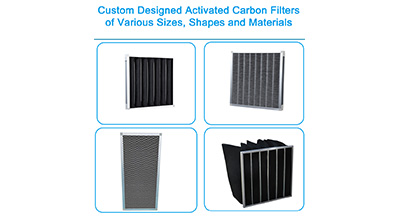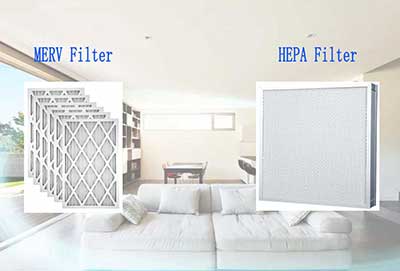 April 10, 2025
April 10, 2025
Air quality matters, especially in industries where precision, cleanliness, and safety are top priorities. Whether you're running a pharmaceutical facility, electronics manufacturing plant, or a cleanroom environment, one component plays a critical role in maintaining clean air—the Industrial HEPA H14 Filter.
In this blog, we’ll walk you through everything you need to know about HEPA H14 filters used in industrial applications: what they are, how they work, where they’re used, and how to choose the right one for your needs.
HEPA stands for High-Efficiency Particulate Air. These filters are designed to remove at least 99.995% of airborne particles with a diameter of 0.3 microns (according to EN 1822 standard for H14). That’s extremely efficient—making H14 filters among the highest-performing HEPA filters available.
To put it in perspective, human hair is about 70 microns thick. HEPA H14 filters can trap particles more than 200 times smaller than that!
- Filtration Efficiency: ≥ 99.995% for particles of 0.3 µm
- Material: Typically made with high-density microglass fiber media
- Frame Options: Galvanized steel, stainless steel, aluminum, or ABS plastic
- Sealing Gaskets: Polyurethane, neoprene, or gel seals for airtight fit
- Tested Individually: Each unit is often tested with a particle counter before shipping
- Temperature Resistance: Many models can withstand up to 70–120°C
HEPA H14 filters capture particles through a combination of the following mechanisms:
1. Interception: Particles that follow the air stream come close to a fiber and stick to it.
2. Impaction: Larger particles collide directly with fibers and get trapped.
3. Diffusion: Very small particles move randomly and are captured by fiber intersections.
This multi-layered capture strategy is what makes HEPA H14 filters so powerful.
HEPA H14 filters are used in a wide range of industries, especially where ultra-clean air is essential. Here are some typical applications:
1. Pharmaceutical Manufacturing
- Prevents contamination of drugs during production
- Required in GMP (Good Manufacturing Practice) environments
2. Hospitals and Cleanrooms
- Maintains sterile conditions in operating rooms and intensive care units
- Used in laminar flow hoods and FFUs (Fan Filter Units)
3. Semiconductor and Electronics Industry
- Keeps dust and particles away from sensitive components
- Crucial for microchip manufacturing
4. Aerospace and Precision Engineering
- Protects delicate equipment from dust
- Helps maintain clean assembly areas
5. Food and Beverage Production
- Keeps airborne bacteria and molds out of the production process
- Ensures food safety standards are met
6. Laboratories and Research Facilities
- Maintains air purity during sensitive experiments
- Helps protect lab personnel and samples
✅ Ultra-High Efficiency: Removes even the tiniest particles, including viruses and bacteria
✅ Improved Product Quality: Cleaner air means fewer defects and less contamination
✅ Compliance with Regulations: Helps meet FDA, GMP, ISO, and other air quality standards
✅ Long Service Life: Industrial-grade filters can last longer with proper maintenance
✅ Worker Safety: Reduces exposure to harmful airborne contaminants
When selecting a HEPA H14 filter for your facility, consider the following factors:
1. Airflow Requirements
- Know your HVAC system’s CFM (Cubic Feet per Minute) to avoid pressure drops.
2. Filter Size and Frame Type
- Match the dimensions and material to your existing system.
3. Sealing Method
- Gasket or gel seal? Gel seals offer better leak prevention in critical applications.
4. Installation Environment
- Consider temperature, humidity, and chemical exposure.
5. Certification and Testing
- Choose filters that are individually tested and certified per EN 1822 or ISO 29463 standards.
6. Maintenance Needs
- Ask about recommended filter change intervals and cleaning options if applicable.
Although HEPA filters are not typically washable, proper maintenance extends their life and ensures optimal performance:
- Pre-Filters Help: Use pre-filters to catch large particles and protect your HEPA filter.
- Regular Inspections: Visually check for damage, dust buildup, and seal integrity.
- Scheduled Replacements: Change filters based on manufacturer recommendations or pressure drop readings.
- Avoid Overloading: Don’t exceed the airflow limit—it reduces efficiency and shortens lifespan.
❌ Myth 1: All HEPA filters are the same.
Truth: HEPA filters vary in efficiency. Only H14 filters meet the 99.995% requirement.
❌ Myth 2: HEPA filters remove gases and odors.
Truth: HEPA filters capture particles, not gases. Use activated carbon filters for odors.
❌ Myth 3: You can clean and reuse them indefinitely.
Truth: Industrial HEPA filters should be replaced, not washed, to maintain performance.
Industrial HEPA H14 filters are essential tools in maintaining air purity across various demanding industries. Their ultra-high efficiency helps protect people, processes, and products from harmful airborne particles.
If your operation requires clean air, investing in a certified H14 HEPA filter is not just a smart move—it's often a regulatory necessity.
Work with a reputable supplier that offers high-quality, tested, and certified filtration products tailored to your industry's needs.
 Mar. 05, 2024
The Science Behind Chemical Air Filters: Enhancing Indoor Air Quality
Mar. 05, 2024
The Science Behind Chemical Air Filters: Enhancing Indoor Air Quality
 Aug. 21, 2023
Application of Air Filters
Aug. 21, 2023
Application of Air Filters
 Mar. 27, 2024
What is the difference between MERV Filter and HEPA Filter?
Mar. 27, 2024
What is the difference between MERV Filter and HEPA Filter?